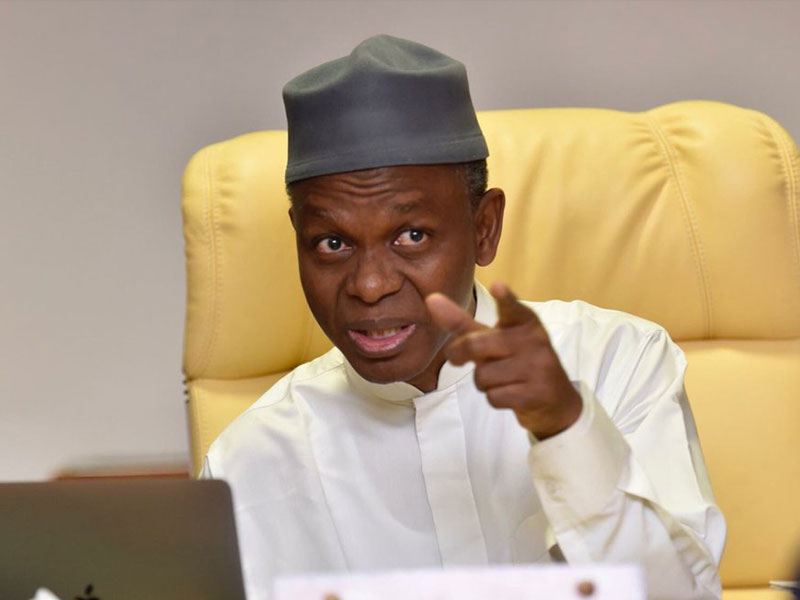Headlines
Former Defence Chief, General Joshua Dogonyaro Dies at 80

Lt. General Joshua Nimyel Dogonyaro (Rtd) is dead.
The officer, who heralded and read the coup speech that ended the regime of Nigeria’s current President, General Muhammadu Buhari (Rtd) and brought General Ibrahim Babangida (Rtd) to power on August 27 1985 died in Jos, Thursday morning after a brief illness.
He turned 80 on 12 September 2020. General Dogonyaro was a former Chief of Defence Staff and is survived by his wife Zainab Esther Dogonyaro and seven children.
Headlines
El-Rufai Accuses Tinubu’s Govt of Paying Trillions of Naira in Fuel Subsidy

The immediate past Governor of Kaduna State, Nasir El-Rufai, has ignited debate on fuel subsidies, alleging that President Bola Tinubu’s government has spent trillions of Naira subsidizing petrol (PMS) since taking office in May 2023.
This revelation comes amidst ongoing discussions about fuel subsidies in Nigeria.
The government previously announced a removal of fuel subsidies, leading to a rise in pump prices. However, El-Rufai suggests the effort was unsuccessful, forcing a return to subsidies at a reportedly higher cost.
The former governor spoke on Monday in Maiduguri, the Borno State capital while delivering a Lead Paper at the occasion of Capacity Building Workshop on Enhancing Skills of Government Officials in Policy Implementation.
“The present administration,” El-Rufai said, “has so far spent trillions of naira for subsidy, even exceeding pre-removal levels,” he stated.
He claimed the current price of petrol, between N600 and N750 per litre, is artificially low due to the subsidy. Without it, prices could be closer to those of diesel, which currently exceed N1,000 per litre in some areas.
“But as I also said earlier during my presentation, the removal of fuel subsidy by the present administration is another good policy by President Tinubu. I have always supported withdrawal of fuel subsidy.
“But as you can see, in the course of implementation, the government has now realized that the subsidy has to be back, because right now, we are paying a lot of money amounting to trillions of naira for subsidy even more than before, because the impact has been seen and the packages of support that will reduce the impact have not been effective in reducing the impact, and so, the federal government has to backpedal by subsidizing petrol.
“Many people don’t know this. If they want to know whether there is fuel subsidy or not, they should compare the prices of petrol and diesel per litre. This is because, under normal circumstances, petrol suppose to be more expensive than diesel. As it is, diesel is above N1000, while petrol stood at about N600 per litre. So we are still subsidizing for fuel in Nigeria,” he stated.
El-Rufai’s comments raise questions about the effectiveness and sustainability of fuel subsidies in Nigeria. The high cost highlighted by El-Rufai suggests the program may be straining government resources. It remains to be seen how the Tinubu administration will address this issue and whether they plan to revisit subsidy removal attempts.
Headlines
APC Suspends National Chairman, Ganduje over Bribery, Corruption Allegations

The All Progressives Congress ward in Ganduje, Dawakin Tofa Local Government Area, has suspended the party’s National Chairman, Dr. Abdullahi Ganduje.
The party ward legal adviser, Halliru Gwanzo, announced the suspension while addressing newsmen in Kano State on Monday.
Gwanzo cited allegations of bribery against Ganduje levelled by the Kano State Government as the reason for the suspension.
“We decided to suspend Dr. Abdullahi Ganduje from the party due to the seriousness of the allegations against him,” Gwanzo said.
Meanwhile, efforts to contact the Chief Press Secretary to the APC National Chairman, Mr Edwin Olufo, failed as his mobile phone was unreachable.
Headlines
Tinubu’s Govt Secures $750m World Bank Loan to Boost Electricity

The Federal government has secured a $750 million loan from the World Bank to provide subsidy to developers and operators of solar mini-grids in the country.
The Minister of Finance, Wale Edun, and World Bank’s Country Director for Nigeria, Shubham Chaudhuri, signed the loan agreement on March 31 and February 19 respectively.
The loan, according to a document made available to journalists on Thursday, is aimed at augmenting the supply of electricity to both households and micro, small, and medium-sized enterprises (MSMEs) through a surge in private sector-led distributed renewable energy initiatives.
It read: “The loan will be partly used to provide support to the development and operation of privately owned and operated solar hybrid mini grids in unserved and underserved areas through:
1.1. Minimum Subsidy Tender Carrying out of Minimum Subsidy Tender processes and provision of Minimum Capital Cost Subsidies to selected developers/operators of (a) Isolated mini- grids; (b) Interconnected mini-grids; or (c) Solar rooftop solutions in Participating States.”
Aside from providing the subsidy, the Federal government plans to also provide performance-based grants.
“There will be a provision of Performance-Based Grants to eligible mini-grid operators based on new customer connections for isolated mini-grids and percentage of capital expenditures for interconnected mini-grid projects.
“The grant will also cover Standalone Solar (SAS) Systems for Households, MSMEs, and Agribusinesses. This grant will provide “Support to the expansion of SAS systems for households, MSMEs, and agribusinesses in rural areas through:
2.1. Performance Based Grants for Standalone Solar Provision of Performance Based Grants (“PBGs”) to eligible companies to rapidly deploy SAS solutions in rural and underserved areas, through supply and demand side support and based on independently verified outputs, and to support deployment of solar productive use of electricity (PUE) equipment to MSMEs, agribusinesses and commercial customers.”





